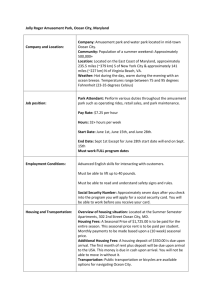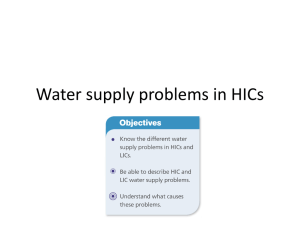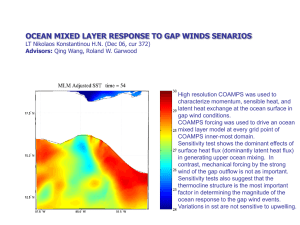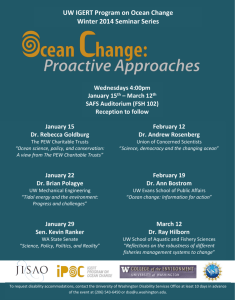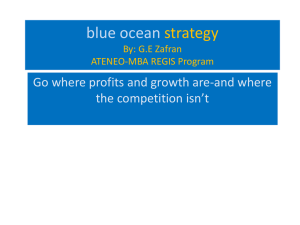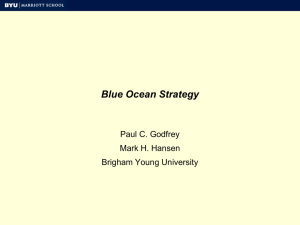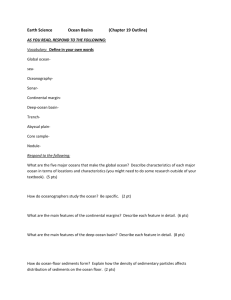Climate & Seasonal Cycle Workshop Programme 29 July 2010
advertisement
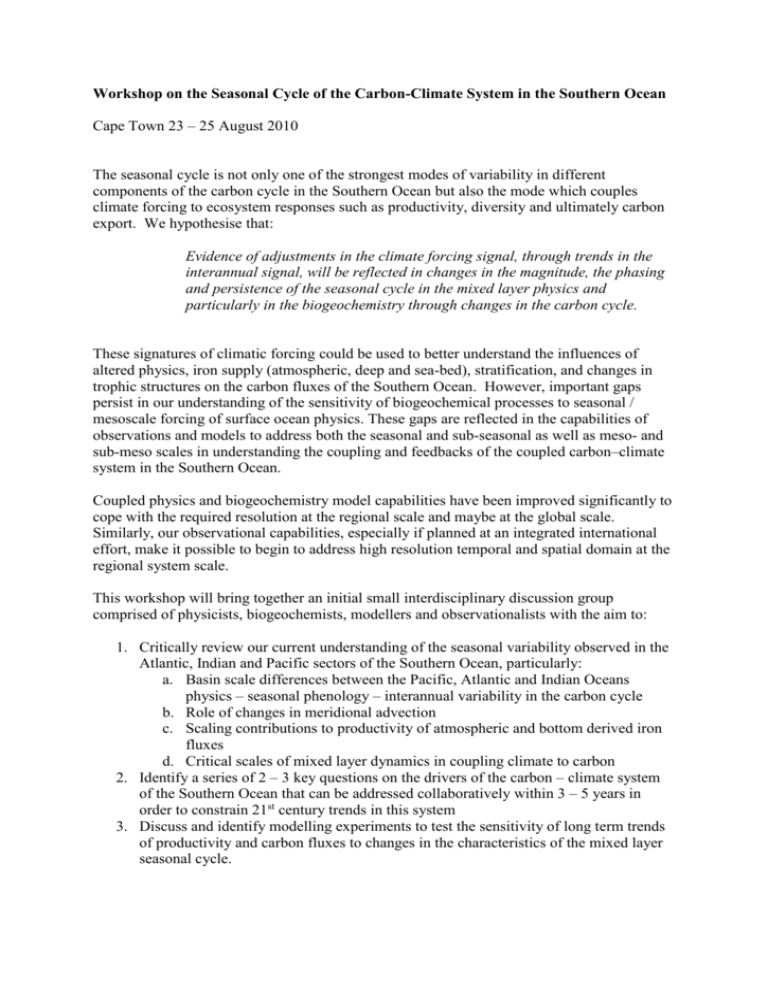
Workshop on the Seasonal Cycle of the Carbon-Climate System in the Southern Ocean Cape Town 23 – 25 August 2010 The seasonal cycle is not only one of the strongest modes of variability in different components of the carbon cycle in the Southern Ocean but also the mode which couples climate forcing to ecosystem responses such as productivity, diversity and ultimately carbon export. We hypothesise that: Evidence of adjustments in the climate forcing signal, through trends in the interannual signal, will be reflected in changes in the magnitude, the phasing and persistence of the seasonal cycle in the mixed layer physics and particularly in the biogeochemistry through changes in the carbon cycle. These signatures of climatic forcing could be used to better understand the influences of altered physics, iron supply (atmospheric, deep and sea-bed), stratification, and changes in trophic structures on the carbon fluxes of the Southern Ocean. However, important gaps persist in our understanding of the sensitivity of biogeochemical processes to seasonal / mesoscale forcing of surface ocean physics. These gaps are reflected in the capabilities of observations and models to address both the seasonal and sub-seasonal as well as meso- and sub-meso scales in understanding the coupling and feedbacks of the coupled carbon–climate system in the Southern Ocean. Coupled physics and biogeochemistry model capabilities have been improved significantly to cope with the required resolution at the regional scale and maybe at the global scale. Similarly, our observational capabilities, especially if planned at an integrated international effort, make it possible to begin to address high resolution temporal and spatial domain at the regional system scale. This workshop will bring together an initial small interdisciplinary discussion group comprised of physicists, biogeochemists, modellers and observationalists with the aim to: 1. Critically review our current understanding of the seasonal variability observed in the Atlantic, Indian and Pacific sectors of the Southern Ocean, particularly: a. Basin scale differences between the Pacific, Atlantic and Indian Oceans physics – seasonal phenology – interannual variability in the carbon cycle b. Role of changes in meridional advection c. Scaling contributions to productivity of atmospheric and bottom derived iron fluxes d. Critical scales of mixed layer dynamics in coupling climate to carbon 2. Identify a series of 2 – 3 key questions on the drivers of the carbon – climate system of the Southern Ocean that can be addressed collaboratively within 3 – 5 years in order to constrain 21st century trends in this system 3. Discuss and identify modelling experiments to test the sensitivity of long term trends of productivity and carbon fluxes to changes in the characteristics of the mixed layer seasonal cycle. 4. Discuss the need, the feasibility and the format of a coordinated international (multiplatform) experiment(s) to understand the seasonal variability of the carbon cycle in the Southern Ocean The Workshop will be run over 3 days: Day 1: Review our current understanding (plenary presentations followed by group discussion) Day 2: Workshop to formulate key questions and discuss modelling experiments Day 3: Workshop to discuss the need for experiments and coordinated observations Our aim in convening this workshop to is to explore ideas of scale sensitivities of the coupled carbon–climate system as a basis to bring the physics and biogeochemistry communities closer together but with a special focus on the biological pump – carbon export fluxes. Co-conveners: Dr Pedro Monteiro, Dr Philip Boyd and Prof. Tom Trull Workshop on the Seasonal Cycle of the Carbon-Climate System in the Southern Ocean Cape Town 23 – 25 August 2010 Day 1: The objective of Day 1 is to scope our understanding and recent learning around the theme of the workshop. This will be done through a plenary day and a limited discussion. The main discussion period will be in Days 2 & 3. Each presenter is asked to consider 2 – 3 questions that they think will contribute to the objectives of Day 2 & 3. The presentation titles below are indicative only and we ask that each of the participants come back by 15 August with a final title that links their ideas to the workshop framework and objectives. Be provocative. 09:00 Welcome: TBD 09:15 Introduction and workshop goals: (Pedro Monteiro) 09:30 Synthesis of Southern Ocean Carbon Biogeochemistry in South Africa (Pedro Monteiro et al) 09:50 Synthesis of Southern Ocean Carbon Biogeochemistry in Australia (Tom Trull et al) 10:10 Synthesis of Southern Ocean Carbon Biogeochemistry in New Zealand (Philip Boyd et al) 10:30 Break 11:00 Interannual & Seasonal Production in the Southern Ocean: links between forcing, production taxonomy and phenology (Kevin Arrigo) 11:30 Production in the Sub-Antarctic Zone: What do we know about seasonal control of production? (Philip Boyd) 12:00 Comparative Basin scale seasonal cycle characteristics of Cholorophyll: Is there a common link? (Sandy Thomalla / Nicolas Fauchereau) 12:30 Discussion 13:00 – 14:00 LUNCH 14:00 What might be the links between meso-scale – sub seasonal scale mixed layer dynamics and the evolution of seasonal productivity in the Southern Ocean? (Marina Levy) 14:30 The basin scale contrasts of seasonal controls in the variability of NCP, GPP and carbon export fluxes in the Southern Ocean? (Michael Bender / Nicolas Cassar) 15:00 Seasonal cycles in island ecosystem production are they different? (Crozex S Georgia etc) (Mark Moore / Mike Lucas) 15:30 Break 16:00 What are the relative roles of ocean physics versus biogeochemistry in driving carbon cycling in the contemporary Southern Ocean and how do these vary between basins and zones? (Richard Matear) 16:30 What do models and observations tell us about the influence of sources and fluxes of iron on the seasonal and interannual variability of productivity? (Alessandro Tagliabue) 17:00 Discussion 17:30 End – Transport to Dinner Day 2 – Southern Ocean Biological Carbon Pump in 21st century climate Objectives: Identify a series of 2 – 3 key questions on the drivers of the carbon – climate system of the Southern Ocean that can be addressed collaboratively within 3 – 5 years in order to constrain 21st century trends in this system. Identify what kind of modelling experiments are required to address those questions and to optimise experimental and long term observations Eg: What kind of modelling experiments are needed to better understand a. the climate – physics – biogeochemistry sensitivities b. carbon – climate feedbacks c. the highest priorities in observational experiments and long term observations 09:00 Synthesis of Workshop aims and key points arising from Day 1: 15 min 09:15: Short Plenary of Introductory Papers 09:15 What are the recent trends in the SAM and implications for seasonal mixed layer dynamics and carbon biogeochemistry in the Southern Ocean? (Nicolas Fauchereau) 09:45 What do models tell us about the sensitivity of carbon fluxes (special focus on biological pump) to the scales at which the Southern Ocean is forced? (Andrew Lenton / Alessandro Tagliabue / Richard Matear) 10:15 Break 10:45 Workshop Discussion I: Chair Tom Trull Possible Questions: a) Is the seasonal cycle an important and useful mode to understand the linkages between large scale Climate Modes and changes in the biological pump? a. Ecosystem questions: phenology, taxonomy b. Mixed layer dynamics – light vs nutrient supply c. Influence of Fe sources: aerosol vs eddies, sediments, bottom pressure torque, island wakes b) How sensitive are these physics – biogeochemistry linkages to altered forcing due to a changing climate? c) What feedbacks could emerge as a result of a changing climate? 13:00 – 14:00 LUNCH 14:00 – 15:30 Workshop Discussion II Discuss and identify modelling experiments to test the sensitivity of long term trends of productivity and carbon fluxes to changes in the characteristics of the mixed layer seasonal cycle. 16:00 – 17:30 Workshop Discussion III Can modelling experiments help us to identify what type of observational requirements to better understand the variability and long term trends in carbon fluxes in the Southern Ocean? Day 3: Is there a strategic value of coordinating Cape Town, Hobart and Wellington as centres of circumpolar Southern Ocean carbon – climate research and observation? Questions: What are the highest priorities in observational experiments and long term observations in the Southern Ocean? Is there the need and the feasibility of a coordinated international (multi-platform) experiment(s) to understand the seasonal variability of the carbon cycle in the Southern Ocean. What form could it take? This follows on from themes in Day 2 and in particular point - if the models are suggesting where and what might be the most likely indicator of change - can we design an appropriately scaled observational programme to confirm or refute this? 09:00 Review of Day 2 09:15 Scales of Variability of CO2 fluxes in the Southern Ocean. What does it tell us about the scales at which models and observations should be made (Andrew Lenton) 09:45 Understanding the sensitivity of seasonal evolution of SAZ carbon fluxes to interannual variability in forcing from time series experiments (Tom Trull/Scott Nodder) 10:15 Understanding the sensitivity of carbon fluxes to biogeochemical forcing from observational experiments - from shipboard to large scale natural process studies eg: Crozex; SAZ SENSE (Mark Moore / Mike Lucas / Tom Trull / Philip Boyd) 11: 15 – 13:00 Workshop Discussion I: Chair Phillip Boyd 13:00 – 14:00 LUNCH 14:00 – 15:30 Workshop Discussion II 15; 30 – 16:00 Coffee 16:00 – 17:30 Workshop Session III
